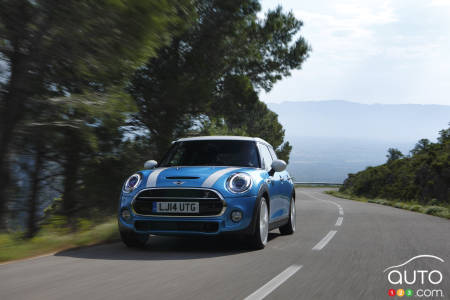“Have you seen the new M4? It’s horrendously piggish and heavy.”
“The new MINI is huge. Nothing like the original. How can they even call it a MINI?!”
“The latest Mazda3 is massive; more like a Mazda6 if you ask me.”
“Is that a new A4? Oh, nope, just a fat A3.”
If cars had feelings, they’d be hurt. Badly.
Often, our first comments regarding a new model are usually related to how much fatter/bigger/wider it’s gotten over the previous generation that was (in our mind’s eye) so svelte and teeny-tiny compared to the latest iteration.
We forget that the reason cars are “bigger” today has a lot to do with safety, technological advances and consumer needs and wants. While we all b*tch about the MINI being as “big” as it is, I’m willing to bet that BMW would be selling a helluva lot fewer models if their wheelbase were still 80.2” (approx. 6-foot) and their interior space equivalent to that of a carry-on luggage. Not to mention the lack in power (only about 34 bhp when the Austin Mini first appeared)…
Today’s buying public complains, a lot. And we complain about lack of space, lack of cup-holders, lack of safety features, lack of tech-y bits, lack of legroom, and a lack of Jeeves in the back to bring us oversized lattes. So, automakers work on providing solutions to as many of those “needs” as they can. And so, cars grow in size and weight because we want them to have more things, do more things, be more things. More means, well more.
The brand new Nissan Micra is, perhaps, the only brand new car that’s not been fat-shamed upon first introduction, and that’s probably because in its base format it’s rather like your high school friend who suffered from an eating disorder in 8th grade because she wanted everyone to like her. Everyone likes the Micra. Because it’s so bare bones?
Celebrities deal with fat-shaming on a daily basis. From Pink to Kelly Clarkson, the ones who are confident enough in themselves answer said shaming with rebuttals that include promoting their happiness, well-being, and self-worth. They don’t “care” that they’ve gained weight and are no longer their lean, skinny selves because they are healthy and content.
Well, cars can’t exactly talk back, but I imagine if they could, they’d comment along the same lines.
Sure, the new M4 and even the M3 are both leagues larger than their lineage family members. But they’re better for it, replete with advanced safety features, driver dynamic settings, onboard computers and entertainment systems, plushy seats, high-tech headlights/gauge cluster, etc.
Cars are getting bigger. I’m guilty of fat-shaming vehicles myself. I’m currently driving the Lexus RC 350 and it feels fat, heavy, weighted, and big. I remember driving the IS F of years past and it felt “heavy” then, but not as heavy as this big boy. Am I proud of my shaming? Not really. But it’s true.
However, I’ve come to accept that cars are getting bigger. I embrace their largeness now and am thankful for the added weight when it comes to feeling more planted on the road, a more powerful engine, better drivetrain, and fancier interior features.
And while Porsche are clearly the Kardashians of the industry (the larger their booty grows the better they get), the remainder of the auto industry must endure our fat-shaming with grace and poise, just like every other celebrity out there.



